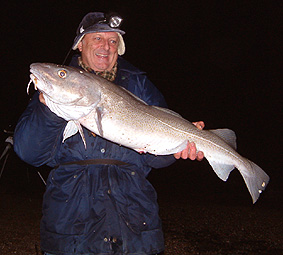A plan for the growth of recreational sea angling has been laid out by
Richard Ferré, the new chairman of the National Federation of Sea Anglers (NFSA).
“Sea angling is a growth area just waiting to be developed while commercial
fin fishing has no growth potential,” he says in a message to central and
local government, sea angling clubs and individual anglers.
“Anglers need more places to fish and more, bigger fish to catch. In return
they will monitor and safeguard the marine environment around our shores.”
He said a million recreational sea anglers in
year generating 19,000 full-time jobs in
powerful voice with government and in fisheries management.
“The commercial sector of the fishing industry cannot be allowed to control
decision making. We believe the indiscriminate use of gill nets needs to be
curbed, and minimum landing sizes increased so it becomes illegal for immature
fish to be sold commercially,” he said.
“We are working with Defra on a strategy for recreational sea angling and
have generated serious discussion on the future of the sea fisheries committees.”
Mr Ferré (59), a lifelong sea angler from Camberley,
fishing boat at
company which employed 3,000 people in ten countries.
When he became chairman of the NFSA’s conservation group in 2004 he was
described in an interview in The Times as someone “who understands politics and
issues and knows how to get things done.”
Mr Ferré said during that in the past three years when Ted Tuckerman had been
chairman, government consultative bodies had agreed to have sea angling
represented on them. Pressure by the NFSA had also helped establish the new
coastal management group in the environment department (Defra) with responsibility
for sea angling.
His predecessor had led the rejuvenation of the NFSA with membership
increasing, financial losses eliminated, the administration streamlined, a vigorous
conservation group in place and success in international competitions.
Increasing the number of sea angling clubs and anglers in the NFSA was now
vital to enable intensive lobbying of the government for vastly better
management of fish and their habitats to continue.
“More than half of all sea anglers fish from the shore and we are opposing
the increasing threat from commercial developers and local authorities to close
places where they have been fishing for many years,” Mr Ferré said. “They
must be allowed to continue to use any safe venue.”
The NFSA’s world class angling teams, competitions and training programmes,
especially for the young, disabled and other minorities would be developed.
They were essential elements of sea angling and the large socio-economic
contribution it made to the nation.
Mr Tuckerman welcomed Mr Ferré saying it was time for a younger man with same
vision to take recreational sea angling forward as the NFSA entered its se
cond century of service to anglers.
Geoff Knight, has been re-elected vice chairman of the federation. He was a
founder nearly 40 years ago of the
continues to flourish. He was chairman of the Bass Anglers’ Sportfishing Society
(BASS) for ten years and subsequently became involved with NFSA management at
divisional and national level.






